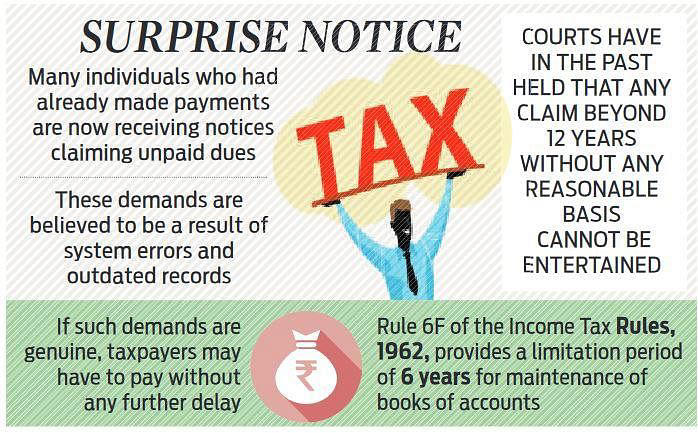Taxpayers are now approaching tax experts as they receive notices from tax authorities for outdated tax demands dating back even 20 years
NEW DELHI: Many taxpayers in the country are facing a perplexing challenge as outdated tax demands, some dating back as far as 20 years, resurface, and this unexpected development has left individuals in a state of confusion and concern, prompting them to seek resolution from tax experts.
Read More: ITR Filing By Individual taxpayers Increases By 90% To 6.37 Crore In AY 2021-22
The demands, believed to be a result of system errors and outdated records, have caught taxpayers off guard. Many individuals who had already made payments or had their demands adjusted against tax refunds are now receiving notices claiming unpaid dues. Others are facing demands for which the window for appeals or rectification applications has already closed.
Shruti K P, a lawyer from IndusLaw, suggests submitting relevant documentary evidence to the tax authorities to prove that payments were made or demands were adjusted. “In case of demands in relation to some old financial years, where the taxpayer had already discharged the payments or where the demands were adjusted against tax refunds, the taxpayer may submit the requisite documentary evidence of such payments / adjustments to the tax authorities. Where such demands are genuine but are not paid till date and even not contested before any appellate forum, the taxpayers may have to pay without any further delay,” she said.
Read More: Discounts, Tax Benefits: How Buying Homes During Festive Season Helps Home Buyers | EXCLUSIVE
“A problem could arise in cases where tax demands are incorrect and the timeline with respect to filing a rectification application or filing of an appeal may have already lapsed. In such cases, the taxpayers should explore other appropriate legal remedies,” she added. However, for genuine unpaid demands, prompt payment is advised to avoid further complications. Aarti Raote, a partner at Deloitte India, emphasizes the importance of contesting incorrect demands without delay. Taxpayers are encouraged to gather supporting documentation to refute the demands and rectify any discrepancies in the records.

“The tax department is obviously updating its records but since the filings in the past were manual which is why there are mismatches observed. However, if taxpayers provide proof to the tax officers, they would correct the records,” Raote stated. Meanwhile, Nabin Ballodia, a partner at BDO India, acknowledges the challenges faced by individuals in retrieving records from two decades ago. He recommends exploring legal avenues, such as representations before the Central Board of Direct Taxes or writ petitions, to contest demands based on undue delay.
Read More: October 31: ITR Filing Last Date For These Entities, Check Full List Here
“Rule 6F of the Income Tax Rules, 1962 provides a limitation period of 6 years from the end of the relevant assessment year for maintenance of books of accounts and other documents for professionals (like legal, medical, accountancy etc). Further Rule 10D provides for a period of 8 years from the end of relevant assessment year, wrt entities undertaking international transactions with associated parties,” Ballodia said.
“Hence, in the given situation, it would be extremely difficult for taxpayers to dig out and provide records which are around 20 years old. In case the taxpayers have old records, which show the tax payment, they can respond to the notice along with the details of taxes paid. However, in case no such records are available, the tax payers would need to consider alternate legal recourse,” he added.
Courts have in the past held that any claim beyond 12 years without any reasonable basis – cannot be entertained in a court of law. One possible option would be to file a representation before the Central Board of Direct Taxes. Another alternative could be to raise the same in a WRIT before the High Court. In the past, there have been known cases, where the courts also suo moto take cognizance of such undue hardship and provide direction for the course of action, as per Ballodia.
According to experts, the sudden surge in notices can be attributed to the ongoing digitization process. As per them, it is possible that some of the old physical records that may not have been updated on the online records, leading to the flurry of notices. However, it would be extremely difficult for the taxpayers as well as the tax department to substantiate the old demand which is around 20 years old.
“The notices do not appear to be a result of error of system – rather could be based on the outdated old records that may have been mapped based on the old Permanent Account Number and the taxpayer. Given the inordinate delay – it would be extremely difficult for the revenue department to recover the tax demand. However, it is likely to create a lot of confusion as well as additional work – both for the taxpayers as well as the revenue department,” added Ballodia.





































